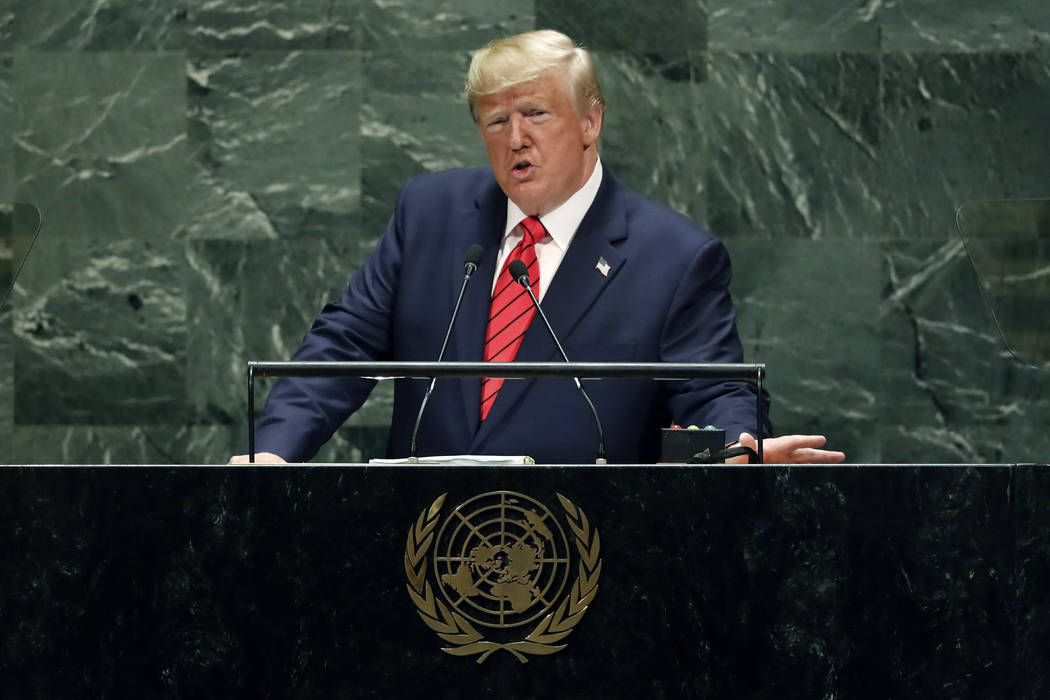Trump promotes patriotism in address to U.N. General Assembly

UNITED NATIONS — President Donald Trump addressed the U.N. General Assembly Tuesday amid growing calls for his impeachment following reports that he froze foreign aid to Ukraine before pushing the Eastern European nation to dig up dirt on former Vice President Joe Biden.
After addressing the body and meeting with various world leaders, Trump announced on Twitter that he had authorized the release of a “fully declassified and unredacted transcript” of his phone conversation with Ukraine President Volodymyr Zelenskiy.
“No pressure and, unlike Joe Biden and his son, NO quid pro quo!” Trump continued. The president has maintained that Biden pressured Kiev to fire a certain prosecutor who had investigated a Ukraine business connected with Biden’s son, Hunter. Biden denies that charge.
As Trump arrived at Turtle Bay in the morning, reporters peppered him with questions about the Ukraine issue, first reported in the Washington Post. Trump responded that the story is “a witch hunt.” He added, “There was no pressure put on them whatsoever.”
Asked about reports that House Speaker Nancy Pelosi would call for his impeachment, Trump replied, “How can you do this and you haven’t even seen the phone call?”
In an uncharacteristically subdued address to the 74th General Assembly, Trump again embraced his faith in national sovereignty as he spoke about his “beloved” country. “The future does not belong to globalists. The future belongs to patriots,” he said.
South Bend, Indiana Mayor and Democratic presidential candidate Pete Buttigieg told CNN, “They wrote him a good speech but he didn’t look like himself… he was playing the role of the American president on the world stage.”
Former deputy national security adviser to President Barack Obama Ben Rhodes summed Trump’s message and button-down delivery: “Trump’s UNGA speech is warmed over nationalist garbage delivered like a late night talk radio host trying to put you to sleep.”
Wags posted video of Commerce Secretary Wilbur Ross who seemed to have nodded off as Trump spoke.
Lanhee J. Chen, a Hoover Institution research fellow and policy expert, described the speech as offering “a positive spin on nationalism. It’s saying there’s nothing wrong to loving your country.”
Using the acronym by which the confab is known, Chen added, “It’s a great UNGA speech going into a campaign cycle.”
Trump summed up his philosophy on leadership with the world: “If you want freedom, take pride in your country. If you want democracy, hold onto your sovereignty. If you want peace, love your nation.” At the same time, he spoke against “endless wars.”
Trump’s third UNGA speech marked a departure from his often bombastic demeanor at Turtle Bay.
In his maiden address in 2017, Trump tweaked the stodgy international community when he announced he wanted to “Make the United Nations Great” – pointedly without adding “again” – and called out North Korea strongman Kim Jong Un as “Little Rocket Man.”
During last year’s opening remarks, attendees laughed at Trump when he said, “In less than two years, my administration has accomplished almost more than any administration in the history of this country.” Trump shrugged it off, saying he didn’t expect that reaction.
Trump also used UNGA to bash China on trade and Iran for putting weapons capabilities before their people, but reached out to North Korea on the grounds that “the United States have never believed in permanent enemies.”
David Maxwell of the Foundation for Defense of Democracies said Trump held bilateral meetings with world leaders who know that they have to play to his ego. Trump met with such favorites as Indian Prime Minister Narendra Modi, with whom the president Trump attended a Houston rally over the weekend, U.K. Prime Minister Boris Johnson and Polish President Andrzej Duda.
Some of the comments seemed to push the boundaries of diplomatic deference. One example, Maxwell offered, is South Korean President Moon Jae-In, who told Trump, “I always marvel at your imagination and bold-decision making.”
Having friendly relations with the president can pay off for foreign heads of state. When a reporter asked Trump why the United States had chosen to send more troops to Poland, “Is it because of Russian threat?”
Trump replied: “No, I don’t think so at all. I think it’s just because we have a president of Poland who I like, who I respect.”
In September, 2018, Duda said that if the 45th President set up a permanent military base in his country, he would want to call it “Fort Trump.”
“Foreign leaders have figured it out,” Chen told the Review-Journal, with Trump “a little bit of flattery goes a long way.”
Contact Debra J. Saunders at dsaunders@reviewjournal.com or at 202-662-7391. Follow @DebraJSaunders on Twitter.